| | | | | | | Presented By Global X ETFs | | | | Axios World | | By Dave Lawler ·Mar 14, 2022 | | Welcome back to Axios World. - Tonight's edition (1,944 words, 7 minutes) takes off from Rome, with stops in Shenzhen, Turkmenistan, Colombia, Afghanistan and, of course, Ukraine.
- Please subscribe, and tell a friend.
| | | | | | 1 big thing: Avoiding a superpower proxy war | 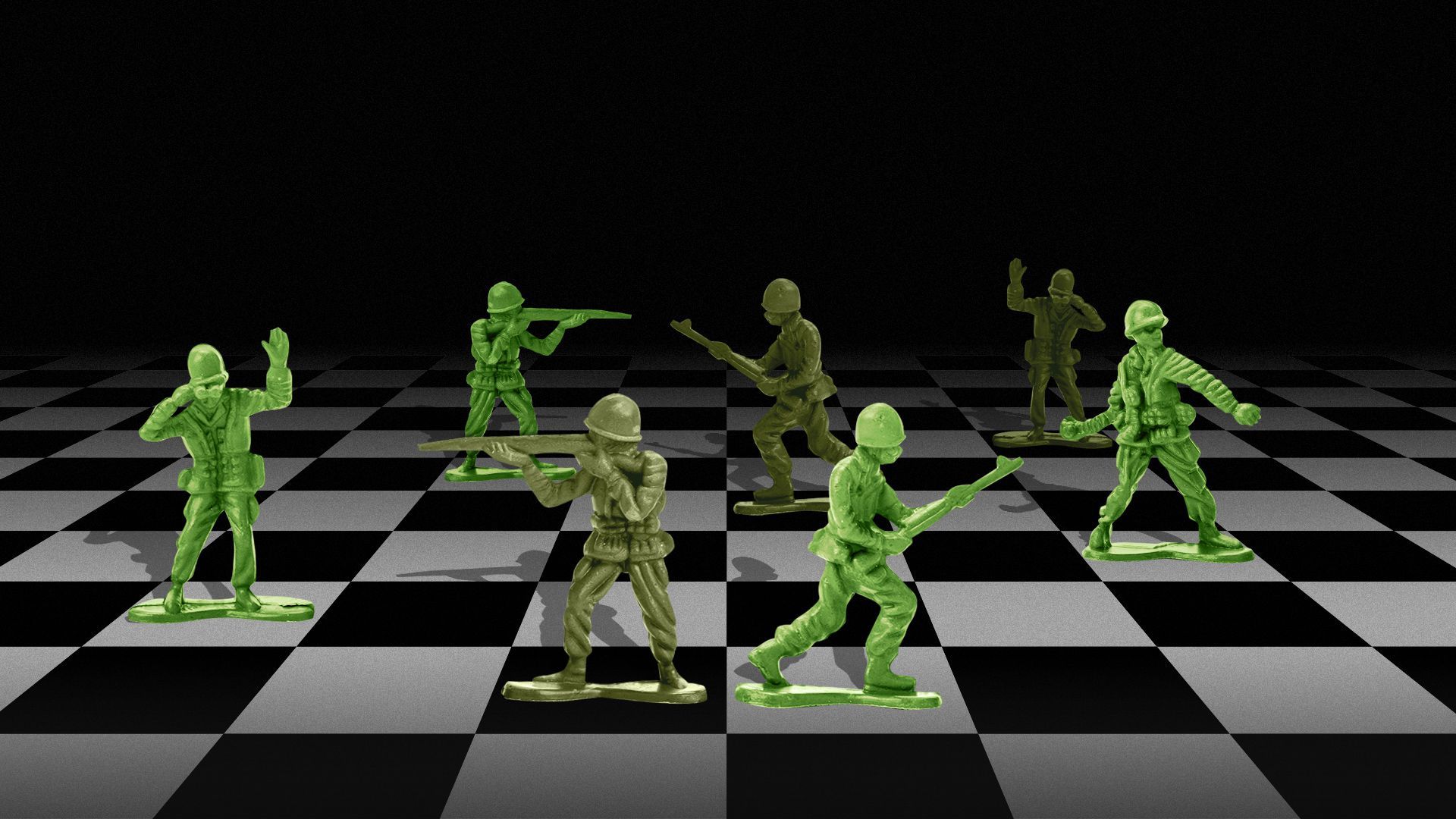 | | | Illustration: Aïda Amer/Axios | | | | In an "intense" seven-hour meeting with China's top diplomat Yang Jiechi today, national security adviser Jake Sullivan warned of "consequences" if Beijing materially supports Russia's war effort in Ukraine, a senior U.S. official briefed reporters. The big picture: China is already providing its most powerful partner with tacit support, but U.S. officials are now trying to draw red lines to prevent a full-on superpower proxy war, Bethany Allen-Ebrahimian and I write. Driving the news: The FT's Demetri Sevastopulo reports that the U.S. has warned allies in a diplomatic cable that China has "signaled its willingness" to provide Russia with weapons. Those include surface-to-air missiles, per the report. - While China's next moves remain uncertain, fears are growing that Washington and Beijing could end up arming either side in a brutal land war — potentially escalating and prolonging it.
- Far beyond the battlefield, such a move would herald an even more adversarial era in U.S.-China relations, says Hal Brands of the Johns Hopkins School of Advanced International Studies. Sanctions and economic decoupling would "find a new gear," and remaining hopes of a constructive relationship would evaporate.
- The U.S. official declined to comment on the potential arms transfers, but said Sullivan shared "deep concerns about China's alignment with Russia" and warned of the "potential consequences of certain actions" during today's meeting in Rome.
- Beijing has denied receiving any such request from Moscow, and it has not armed parties to other recent inter-state conflicts.
State of play: In official public statements, China has presented itself as a neutral arbiter, a defender of sovereignty and international norms, and even a potential peace broker. China abstained from a UN vote condemning Russia, rather than back its most powerful partner. - While Chinese government spokespeople have blamed the U.S. and NATO for Russia's invasion — and aren't actually using the word "invasion" — they're calling for restraint on all sides.
- China's state propaganda machine has picked sides, however. State media is spreading baseless conspiracy theories about supposed U.S. bioweapons labs, government censors are scrubbing any reports of civilian casualties, and Chinese internet forums are full of support for Moscow and vitriol for NATO, as the Economist's David Rennie has reported.
- "If you're Chinese and watching state TV or looking at the heavily censored internet here, you would believe that Russian troops are behaving with extraordinary restraint, that they are there to dislodge Nazis from Ukraine, and that the Americans are the ones pouring fuel on the fire," Rennie notes.
Between the lines: Chinese President Xi Jinping made relations with Russia a pillar of his foreign policy, and he appeared with Vladimir Putin before the invasion in a show of solidarity. - But the war is going badly for Russia on the battlefield and, in particular, in terms of global public opinion. It has united the West and placed additional focus on Taiwan. All of that is costly for Beijing.
- The costs will increase if China helps Russia evade sanctions or offers more overt diplomatic support. They will rise higher still if Xi sends weapons.
- However, Xi may calculate that he needs a strong Russia to occupy U.S. attention and that a catastrophic outcome in Ukraine could destabilize the Putin regime, Brands notes.
The bottom line: Xi's big bet on relations with Putin had been relatively low-risk before now. The U.S. wants to convince him that if he doubles down over Ukraine, he'll come to regret it. |     | | | | | | 2. Global news roundup | 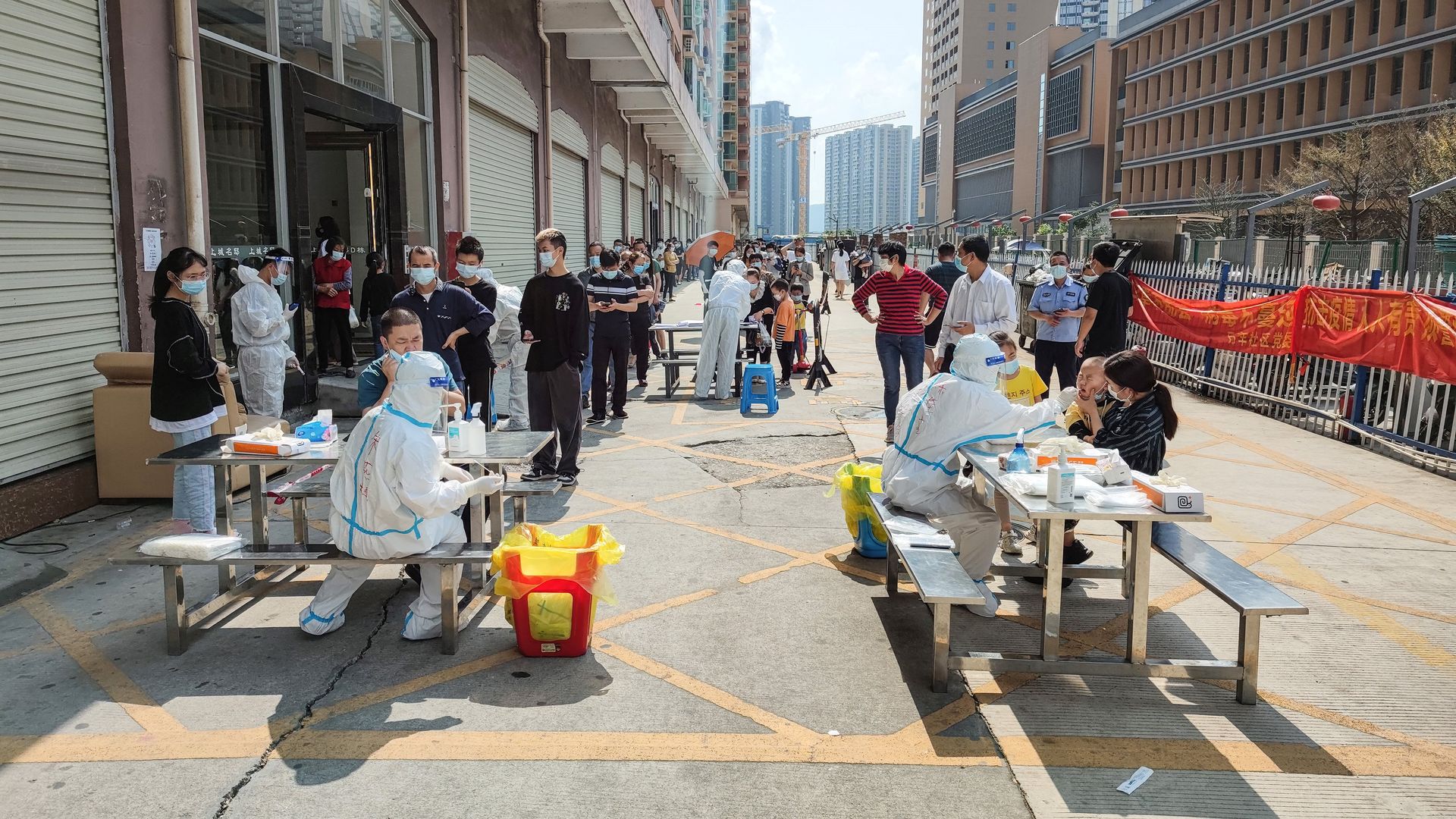 | | | Residents queue to undergo nucleic acid amplification tests for COVID-19 in Shenzhen, China, today. Photo: STR/AFP via Getty Images | | | | 1. The tech hub of Shenzhen is now in lockdown, along with several other Chinese cities. - Local suppliers for Apple, Toyota and VW have already suspended some operations.
- The big picture: For now, this is just a one-week partial lockdown accompanied by a mass testing push. But with vaccines that are less effective than Western alternatives and little immunity in the population, China faces a long-term COVID conundrum with major implications for the global economy.
- What to watch: Cases are once again surging in several European countries, potentially due to the BA.2 variant.
2. Turkmenistan is getting a new president: Serdar Berdimuhamedov is expected to replace his dictator father following a stage-managed election on Saturday in one of the world's least free countries. 3. In neighboring Kazakhstan, the nephew of ex-dictator Nursultan Nazarbayev was arrested in a sign that de-Nazarbayevification is well underway after the unrest in January. The family controls much of the country's wealth. 4. Gustavo Petro, an ex-guerilla and former Bogotá mayor, solidified his status as the front-runner in Colombia's presidential election this May, dominating the primary for the leftist Pacto Histórico coalition. - If Petro does replace conservative Iván Duque, it will be part of a broader leftward shift across the region.
|     | | | | | | 3. The climate stakes of the Ukraine crisis | 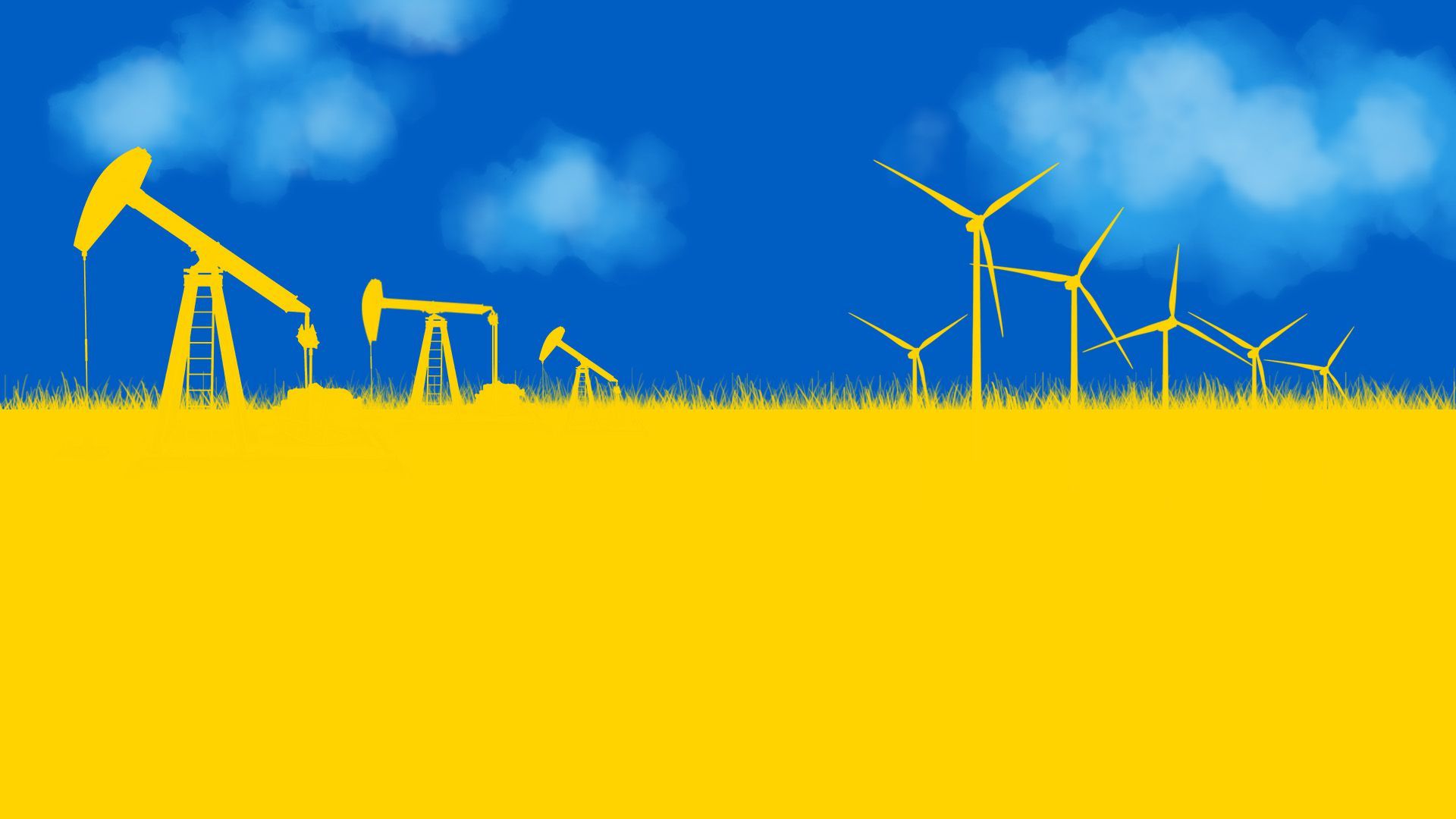 | | | Illustration: Sarah Grillo/Axios | | | | Axios energy reporter Ben Geman breaks down the ways Russia's war on Ukraine could either speed or slow the global transition to clean energy. Pros: - The EU plan to end reliance on Russian fossil fuels by 2027 focuses on diversifying gas suppliers in the near term but is also heavy on renewables, hydrogen, energy efficiency and more. (For now, though, Europe is burning more coal.)
- The White House, many Democrats and environmentalists are pushing to translate Russian aggression into stronger policies to expand clean energy and electric car incentives.
- With gasoline prices at record levels, electric cars could start to look more attractive for the plug-curious.
Cons: - 1. The bandwidth problem: Climate is competing with the biggest war in Europe since World War II, COVID and inflation.
- 2. Oil and gas have fresh political mojo. Policies to deal with the current crisis could lock in new fossil infrastructure for decades.
- 3. Russia is a key supplier of clean energy materials like nickel and copper.
The bottom line: Nobody really knows. Remember when COVID brought speculation that oil demand may have peaked forever? It's projected to surpass pre-pandemic levels this year. - "I have no idea how this kind of meta-crisis shakes up the U.S. energy landscape. ... If it kind of reverts back to 'drill, baby drill' or 'boy, it's time to get out of hydrocarbons,'" said Nikos Tsafos of the Center for Strategic and International Studies.
|     | | | | | | A message from Global X ETFs | | Unlock a new investment opportunity | | | 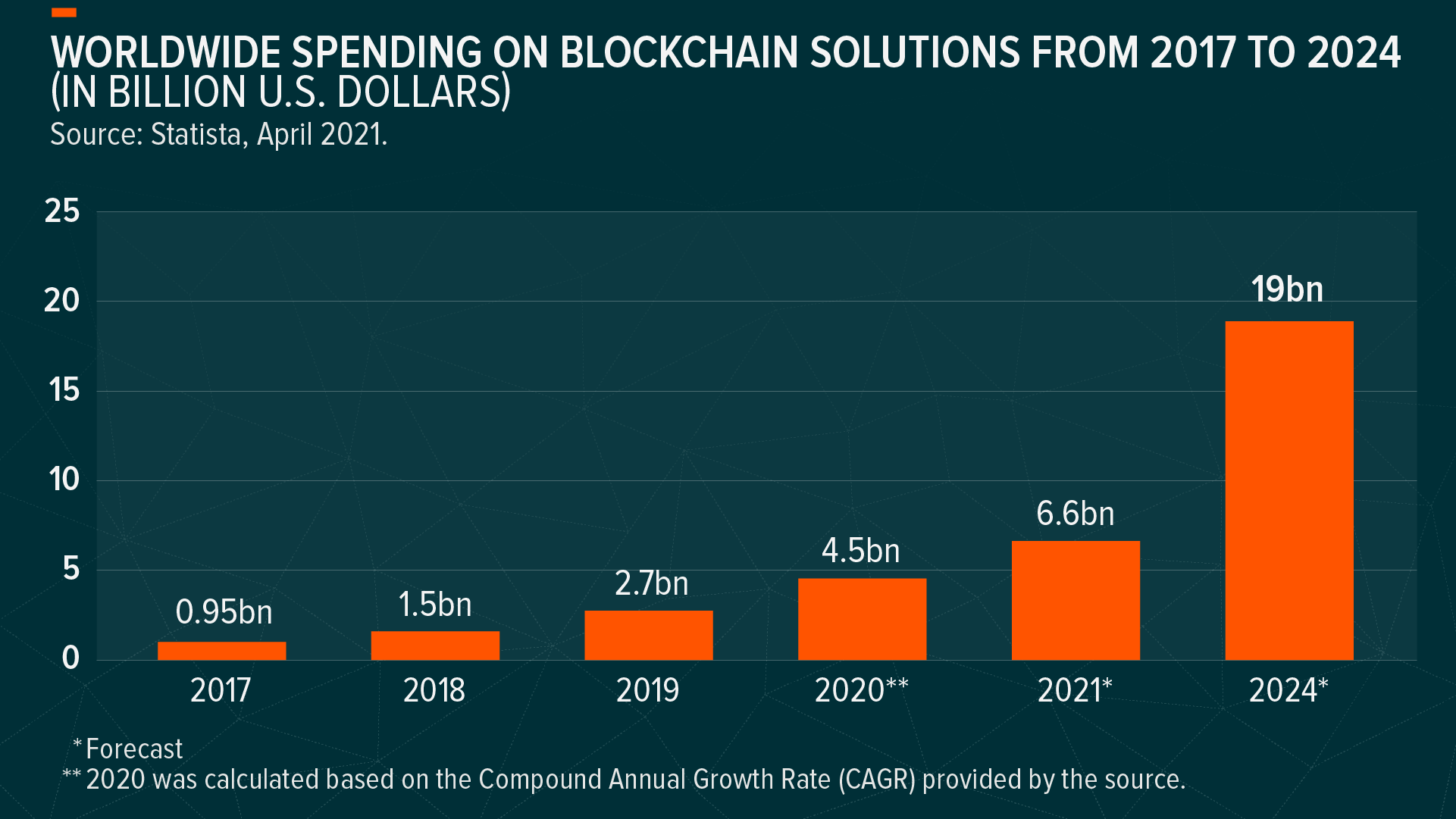 | | | | While famously associated with cryptocurrencies and other digital assets, blockchain's reach now extends to a growing number of uses. The Global X Blockchain ETF (BKCH) is designed to provide investors access to companies at the leading edge of this technology. Explore BKCH. | | | | | | Bonus: Where in the world? | | Today we're visiting all 14 countries that share a land border with Russia. - The list includes three of the world's seven longest borders and one that is just 10.7 miles. Can you name all 14?
Scroll to the bottom for the answers, listed from longest to shortest. |     | | | | | | 4. Taliban provides openings for aid workers | 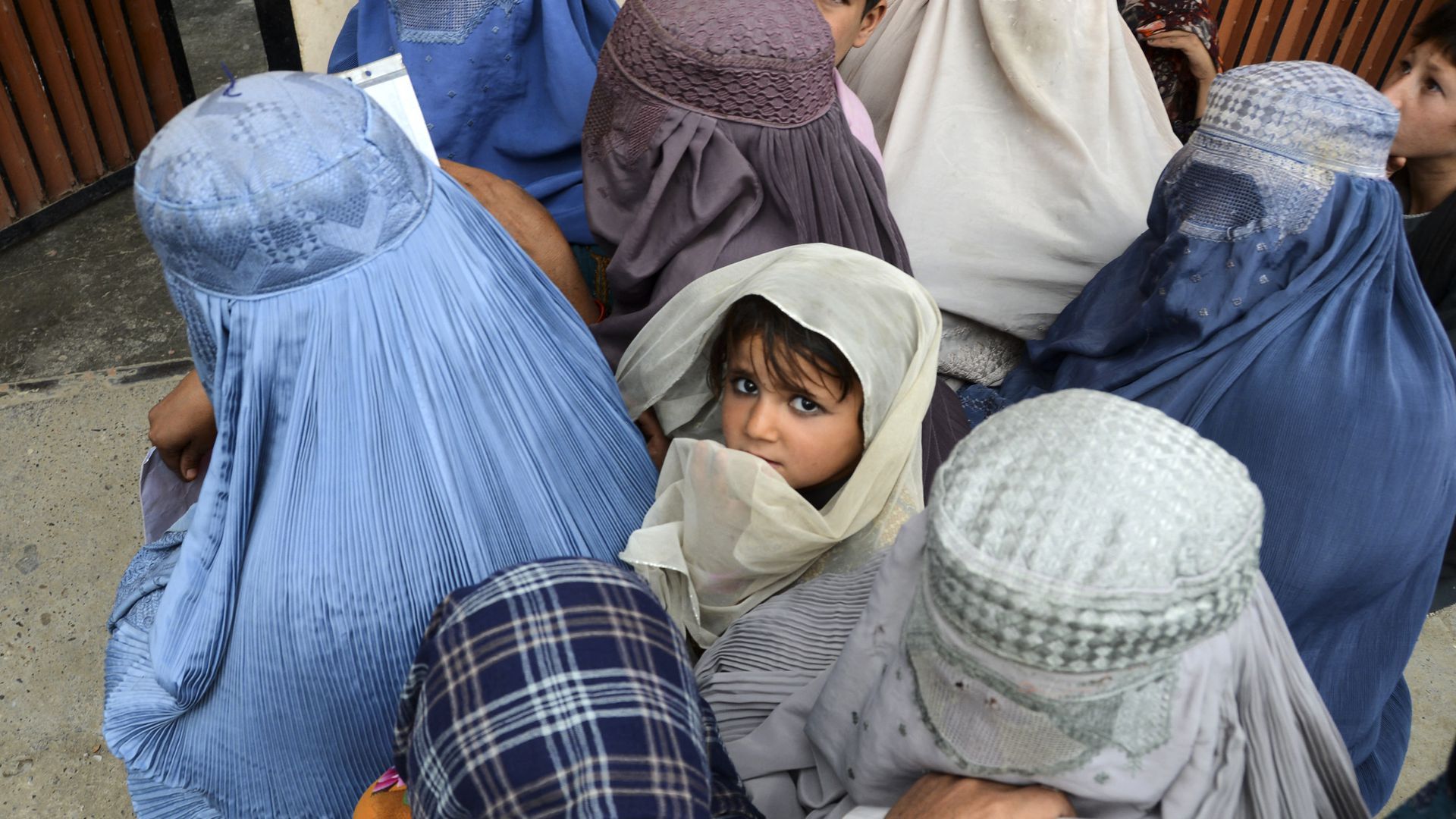 | | | Women with children gather outside a UNHCR office as they wait to receive nonfood items in Kandahar. Photo: Javed Tanveer/AFP via Getty Images | | | | Aid workers in Afghanistan say the Taliban has granted them an unexpected level of access to do their work, but that they still lack the resources needed to combat widespread hunger, Axios' Stef Kight reports. Why it matters: Afghans will die without humanitarian assistance and aid groups say that to provide that assistance, they must engage with the Taliban — no matter whether the group tries to use them to prove its international legitimacy. The big picture: More than half of the country has recently experienced serious food insecurity, with millions at risk of starvation. The economy has crashed as many countries have cut or frozen funding, unwilling to work with the Taliban. - But there have been "genuinely weird, but hopeful meetings with the Taliban government, who are really playing the long game, trying to empower NGOs," the International Rescue Committee's Bob Kitchen tells Axios.
- The Taliban has a history of brutality and subjugation of women, including since taking power last August.
- The group still clearly intends to enforce its strict interpretation of Islam in daily life, but Kitchen says the Taliban is also considering the needs to the population and the views of the international community "because they want to stay in power."
What's happening: Save the Children negotiated with the Taliban to allow female staff to work in provinces across the country, CEO Janti Soeripto told Axios over Zoom from Kabul. - Still, the economic devastation and lack of a national bank in a cash-based economy has severely hurt efforts to provide support to Afghan families — whether through cash transfers from humanitarian groups or remittances from Afghan family members elsewhere.
- That forces families to make "terrible decisions," Soeripto said: "Do I send my girl to school? Do I send her to work? Or do I marry her off ?"
Go deeper. |     | | | | | | 5. Refugee groups warn of trafficking risk for fleeing Ukrainians | 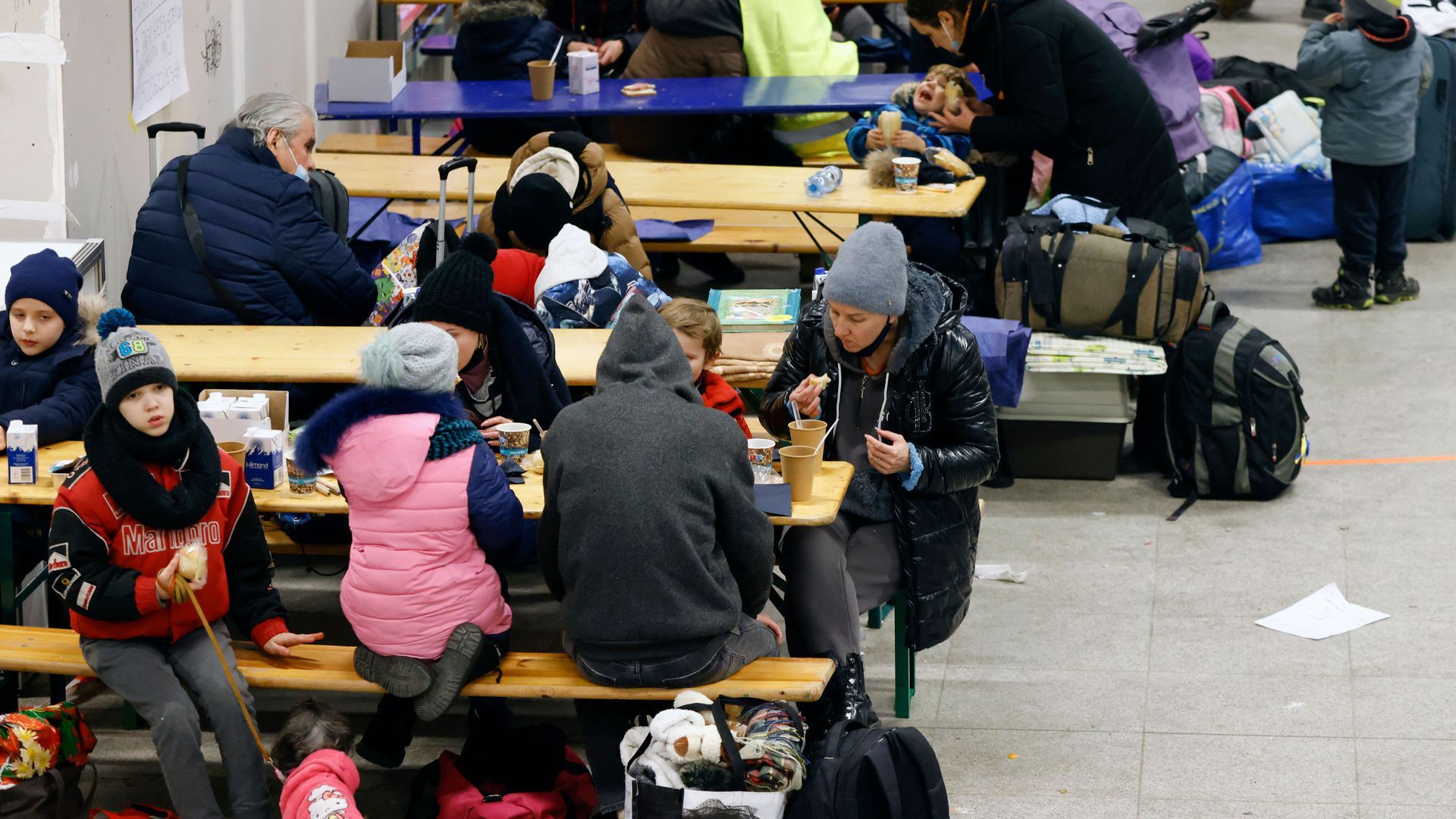 | | | Ukrainian refugees rest and eat in a Berlin train station. Photo: Odd Andersen/AFP via Getty Images | | | | The grassroots efforts across Europe to help and house Ukrainians arriving in unfamiliar countries have helped thousands find refuge, but could also be a human trafficker's "dream," refugee advocates tell "Axios Today" host Niala Boodhoo. The big picture: Almost 3 million people — mostly women and children — have fled Ukraine since Russia invaded on Feb. 24, according to the UN refugee agency. The vast majority have sought refuge in Poland, which has taken in more than 1.7 million refugees in the last 19 days. On the ground: Daphne Panayotatos of Refugees International visited several border crossings into Poland last week, where hundreds of traumatized Ukrainians were greeted with free SIM cards, blankets, meals and offers of rides. Hopefully, most people are well-intentioned, she told Axios, but added: - "Someone's holding a cardboard sign that says 'I can take three people to Berlin' and who knows? It's really creating a huge risk and without proper structures in place to register people, we could see some really negative consequences of this."
Driving the news: Today, the city of Berlin began warning Ukrainian refugees arriving by train to be careful of offers of money or accommodation. - Germany's Interior Ministry says more than 300,000 private homes have been offered as shelter for refugees. But the German government is now asking people to register their homes with the government, rather than approaching people individually.
- Polish authorities on Thursday detained a 49-year-old man for allegedly raping a 19-year-old Ukrainian woman.
- Aid groups are particularly concerned about the risks for children who were unaccompanied or separated from families.
|     | | | | | | 6. What I'm reading: Stalin biographer reflects on Putin |  | | | All options on the (huge) table. Photo: MIkhail Klimentyev/Sputnik via Getty | | | | I enjoyed this conversation between Princeton historian Stephen Kotkin, who specializes in Stalin, and New Yorker editor David Remnick. Some highlights. Kotkin contends that Russia's modern history has been a cycle of rulers trying and failing to eclipse the power of the West, but succeeding in recasting the state in their own image. - The current ruler, Vladimir Putin, likely doesn't get much input from others (particularly when the news is bad), probably thinks he's smarter than everyone else, and may believe his own propaganda, Kotkin says.
- But his apparent belief that he could take Kyiv in three days is hardly the most ridiculous basis on which an autocrat has started a war, Kotkin notes.
- Putin's regime has little to offer Russians but remains popular because it has "stories to tell" — "about the revival of Russian greatness, about enemies at home and enemies abroad who are trying to hold Russia down," he argues.
Looking ahead, Kotkin notes that despite its successes, "Ukraine is winning this war only on Twitter, not on the battlefield." - Of Volodymyr Zelensky, he writes, "having a TV-production company run a country is not a good idea in peacetime," but is working great in wartime.
- He puts the long-term challenge for Russia thusly: "If you're an administrator or a military officer in occupied Ukraine and you order a cup of tea, are you going to drink that cup of tea?"
I've just started Kotkin's massive biography of Stalin. Wish me luck. |     | | | | | | 7. Stories we're watching |  | | | Soccer in Nairobi. Photo: Simon Maina/AFP via Getty | | | - Iran claims Erbil attacks; U.S. condemns
- Chile inaugurates its youngest president ever
- Assange denied extradition appeal
- American journalist killed in Ukraine
- Russia's economy: Over 300 countries exit; "Deep recession" coming; U.S. will feel it
- Putin threatens asset seizures as companies exit
- Russia bans Instagram
Quoted: "Stop the war! Don't believe propaganda! They're lying to you here." — The message on a sign held up by a very brave woman, reportedly producer Marina Ovsyannikova, who burst onto the set of Russia's main evening news broadcast this evening. |     | | | | | | A message from Global X ETFs | | Unlock a new investment opportunity | | |  | | | | While famously associated with cryptocurrencies and other digital assets, blockchain's reach now extends to a growing number of uses. The Global X Blockchain ETF (BKCH) is designed to provide investors access to companies at the leading edge of this technology. Explore BKCH. | | | | Answers: Kazakhstan, China, Mongolia, Ukraine, Finland, Belarus, Georgia, Azerbaijan, Estonia, Latvia, Lithuania, Poland, Norway, North Korea. |  | It's called Smart Brevity®. Over 200 orgs use it — in a tool called Axios HQ — to drive productivity with clearer workplace communications. | | | | | | Axios thanks our partners for supporting our newsletters. If you're interested in advertising, learn more here.
Sponsorship has no influence on editorial content. Axios, 3100 Clarendon Blvd, Suite 1300, Arlington VA 22201 | | | You received this email because you signed up for newsletters from Axios.
Change your preferences or unsubscribe here. | | | Was this email forwarded to you?
Sign up now to get Axios in your inbox. | | | | Follow Axios on social media:    | | | | | |











No comments:
Post a Comment